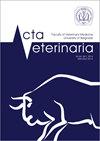Key risk factors and impact of African swine fever spreading on pig production in Serbia
IF 0.8
4区 农林科学
Q3 VETERINARY SCIENCES
引用次数: 8
Abstract
Abstract African swine fever (ASF) is a viral disease of domestic pigs and wild boars and currently represents a major threat to the swine industry worldwide. Disease control is impaired by a lack of an effective vaccine and currently, it is dependent on biosecurity measures in pig production, rapid diagnosis, and stamping out of infected herds. Consequently, this swine disease has considerable social-economic significance on national or even regional level. In 2019 for the first time ASF was detected in the domestic swine population (backyards) in the central region of Serbia. From then on, there have been continuous outbreaks of new cases in the population of domestic and wild boars. Considering domestic pig population, in the majority of cases, ASF was detected in small holdings and backyards. The biosecurity measures are not officially required by veterinary regulation and are only given in a form of recommendations. On the other hand, it is not always possible to implement biosecurity measures that are recognized today as essential for sustainable pig production in the old type of industrial pig facilities. Nowadays, in 2021, it became obvious that the domestic pig cycle, human activities involving pigs, or pig-derived meat products are the dominant driver of virus transmission. Additionally, human activities are frequently a risky connection between domestic pigs and wild boars both directly or indirectly. Traditional, culture-related aspects and facts that politicians failed to recognise ASF as a serious issue that causes great economical losses were found to be very important obstacles in disease control.非洲猪瘟传播对塞尔维亚养猪生产的主要危险因素和影响
摘要非洲猪瘟(African swine fever, ASF)是一种发生在家猪和野猪之间的病毒性疾病,目前是全球养猪业面临的主要威胁。由于缺乏有效的疫苗,疾病控制受到损害,目前,它依赖于生猪生产中的生物安全措施、快速诊断和消灭受感染的猪群。因此,该猪瘟在全国乃至地区层面上具有相当大的社会经济意义。2019年,在塞尔维亚中部地区的家猪群(后院)中首次发现了非洲猪瘟。从那时起,在家猪和野猪种群中不断爆发新的病例。考虑到家猪的数量,在大多数情况下,非洲猪瘟是在小猪场和后院发现的。这些生物安全措施并不是兽医法规的正式要求,只是以建议的形式给出。另一方面,在老式的工业养猪设施中,实施今天公认的对可持续生猪生产至关重要的生物安全措施并不总是可能的。如今,在2021年,很明显,家猪周期、涉及猪或猪源肉制品的人类活动是病毒传播的主要驱动因素。此外,人类活动经常是家猪和野猪之间直接或间接的危险联系。与传统、文化相关的方面和事实,即政治家未能认识到非洲猪瘟是一个造成巨大经济损失的严重问题,被认为是疾病控制的非常重要的障碍。
本文章由计算机程序翻译,如有差异,请以英文原文为准。
求助全文
约1分钟内获得全文
求助全文
来源期刊

Acta Veterinaria-Beograd
农林科学-兽医学
CiteScore
1.30
自引率
16.70%
发文量
33
审稿时长
18-36 weeks
期刊介绍:
The Acta Veterinaria is an open access, peer-reviewed scientific journal of the Faculty of Veterinary Medicine, University of Belgrade, Serbia, dedicated to the publication of original research articles, invited review articles, and to limited extent methodology articles and case reports. The journal considers articles on all aspects of veterinary science and medicine, including the diagnosis, prevention and treatment of medical conditions of domestic, companion, farm and wild animals, as well as the biomedical processes that underlie their health.
 求助内容:
求助内容: 应助结果提醒方式:
应助结果提醒方式:


